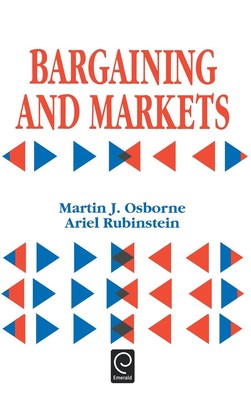
- We will send in 10–14 business days.
- Publisher: Academic Press
- ISBN-10: 0125286325
- ISBN-13: 9780125286329
- Format: 15.5 x 23.4 x 2 cm, hardcover
- Language: English
- SAVE -10% with code: EXTRA
Bargaining and Markets (e-book) (used book) | bookbook.eu
Reviews
Description
The formal theory of bargaining originated with John Nash's work in the early 1950s. This book discusses two recent developments in this theory. The first uses the tool of extensive games to construct theories of bargaining in which time is modeled explicitly. The second applies the theory of bargaining to the study of decentralized markets. Rather than surveying the field, the authors present a select number of models, each of which illustrates a key point. In addition, they give detailed proofs throughout the book. It uses a small number of models, rather than a survey of the field, to illustrate key points, and includes detailed proofs given as explanations for the models. The text has been class-tested in a semester-long graduate course.
EXTRA 10 % discount with code: EXTRA
The promotion ends in 18d.18:33:53
The discount code is valid when purchasing from 10 €. Discounts do not stack.
- Publisher: Academic Press
- ISBN-10: 0125286325
- ISBN-13: 9780125286329
- Format: 15.5 x 23.4 x 2 cm, hardcover
- Language: English English
The formal theory of bargaining originated with John Nash's work in the early 1950s. This book discusses two recent developments in this theory. The first uses the tool of extensive games to construct theories of bargaining in which time is modeled explicitly. The second applies the theory of bargaining to the study of decentralized markets. Rather than surveying the field, the authors present a select number of models, each of which illustrates a key point. In addition, they give detailed proofs throughout the book. It uses a small number of models, rather than a survey of the field, to illustrate key points, and includes detailed proofs given as explanations for the models. The text has been class-tested in a semester-long graduate course.


Reviews